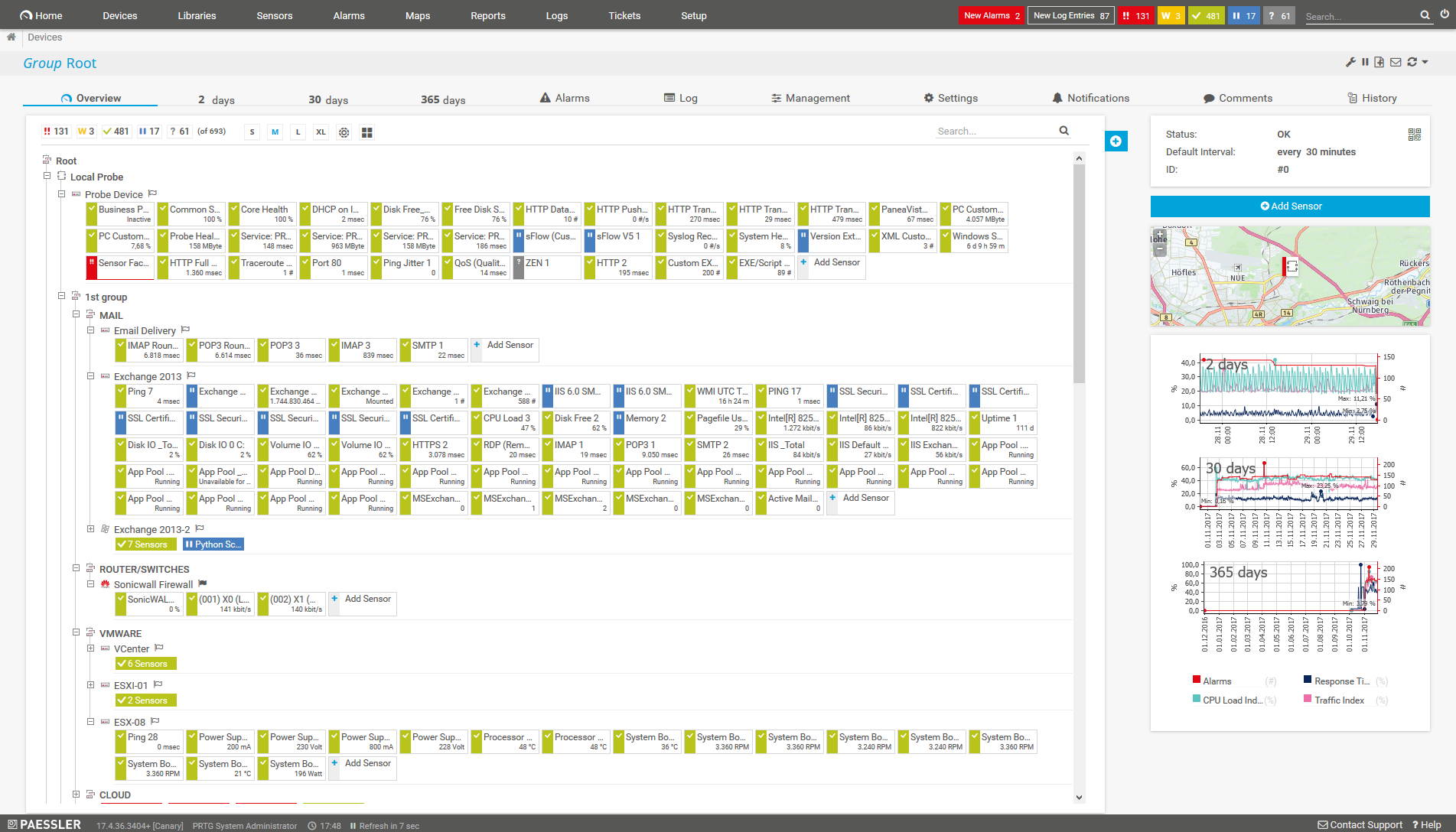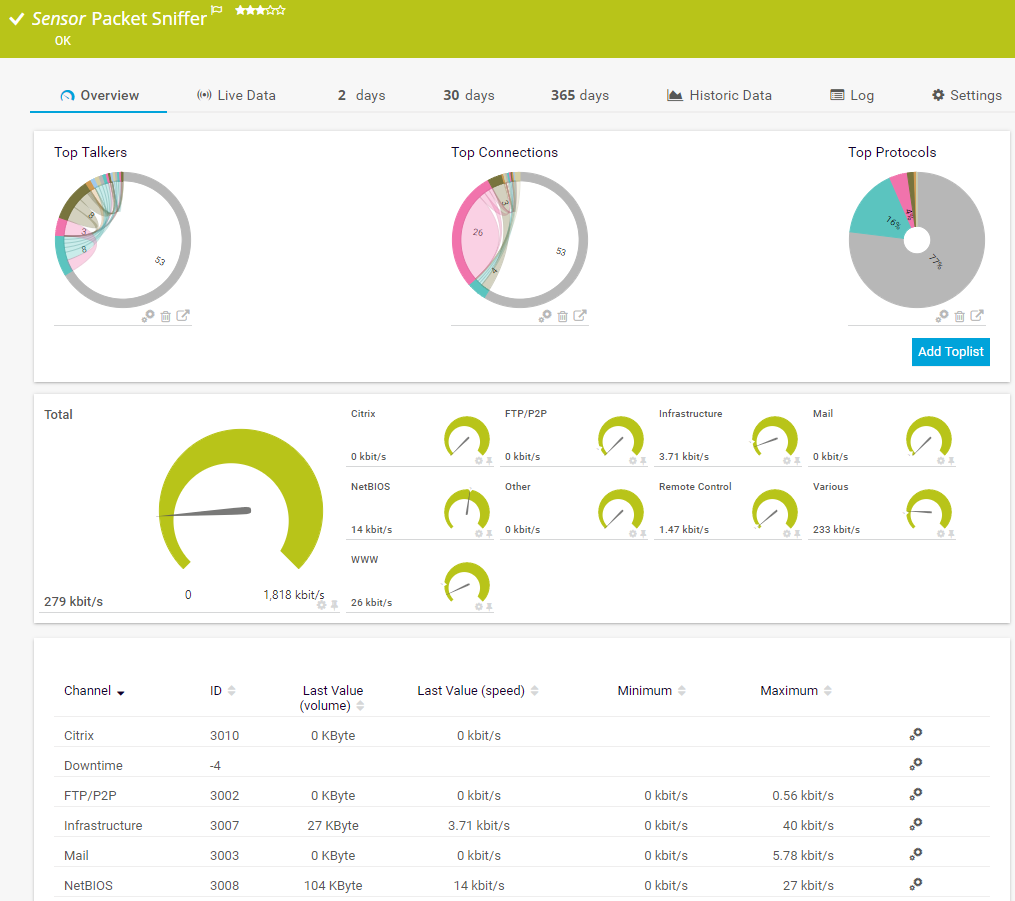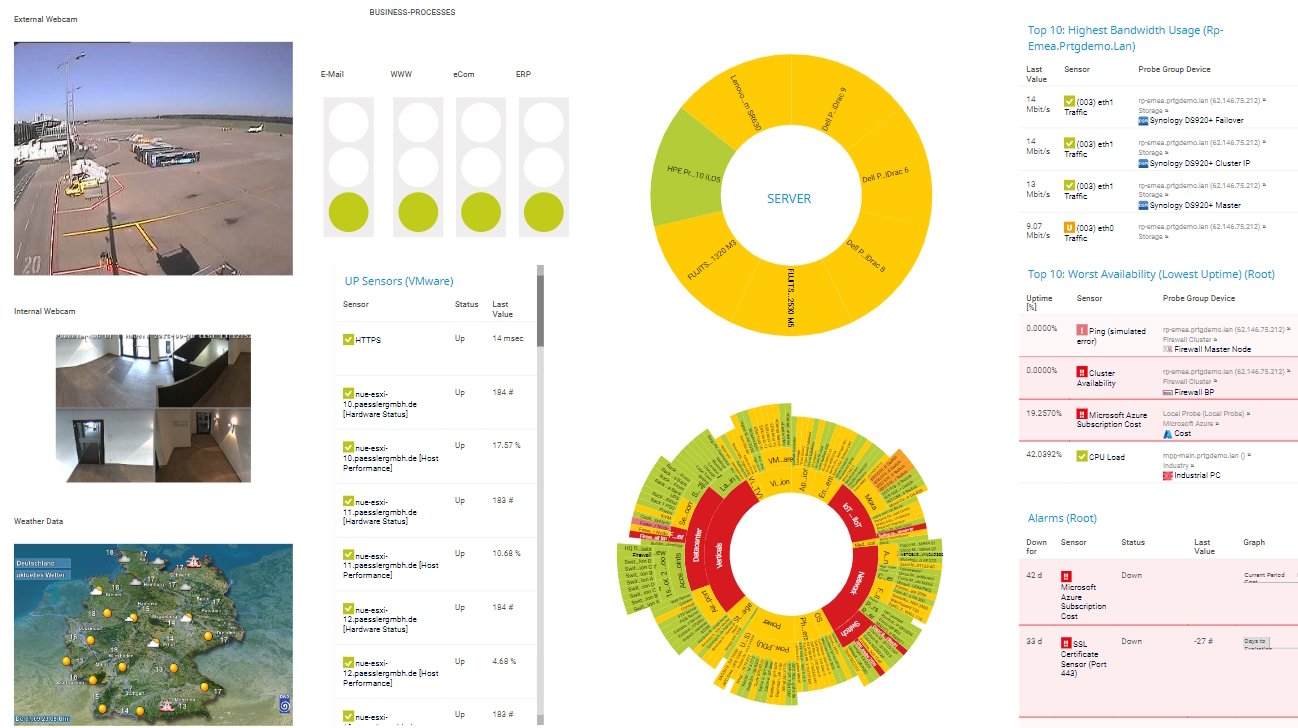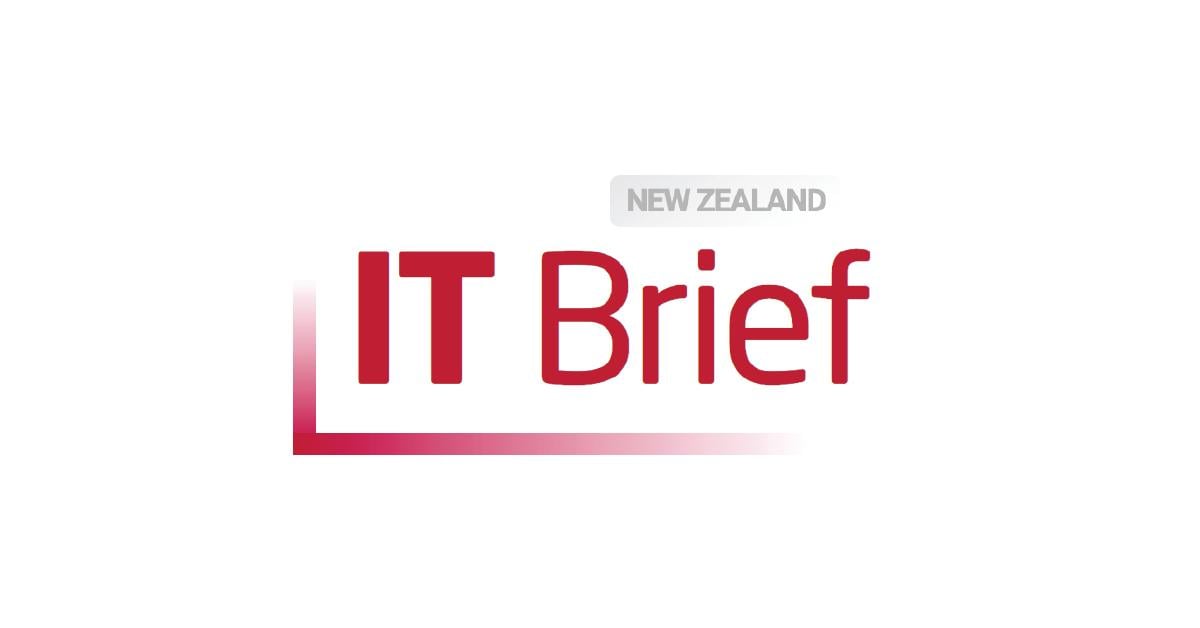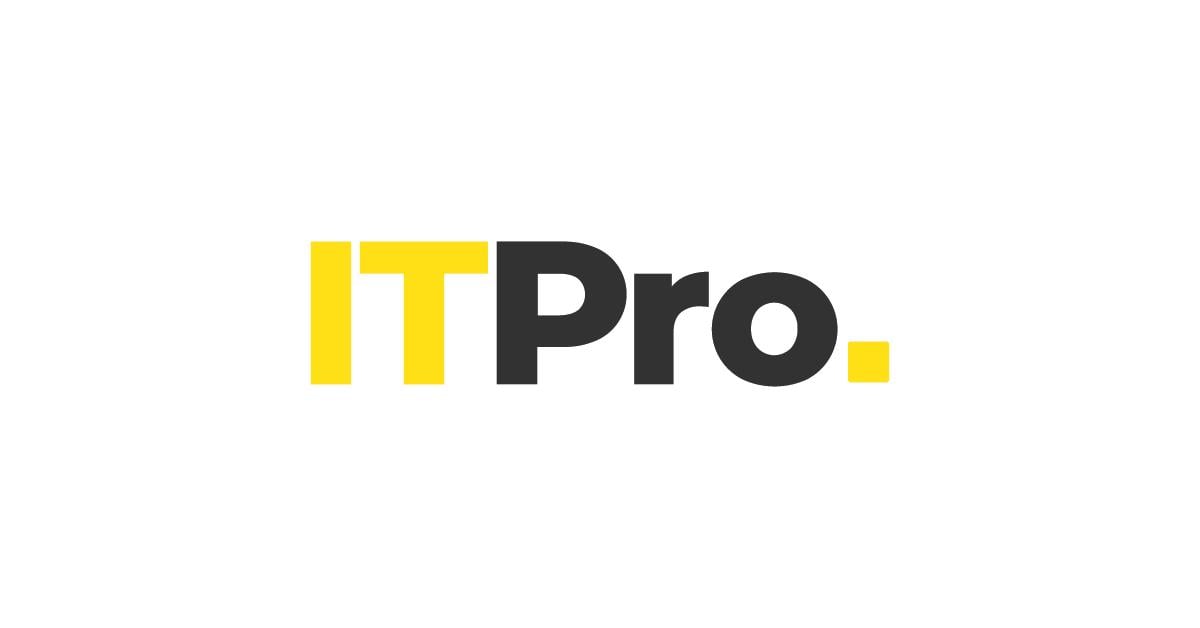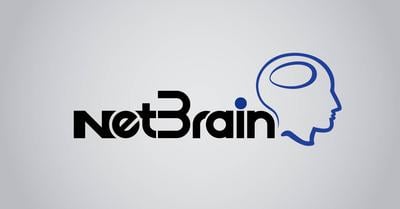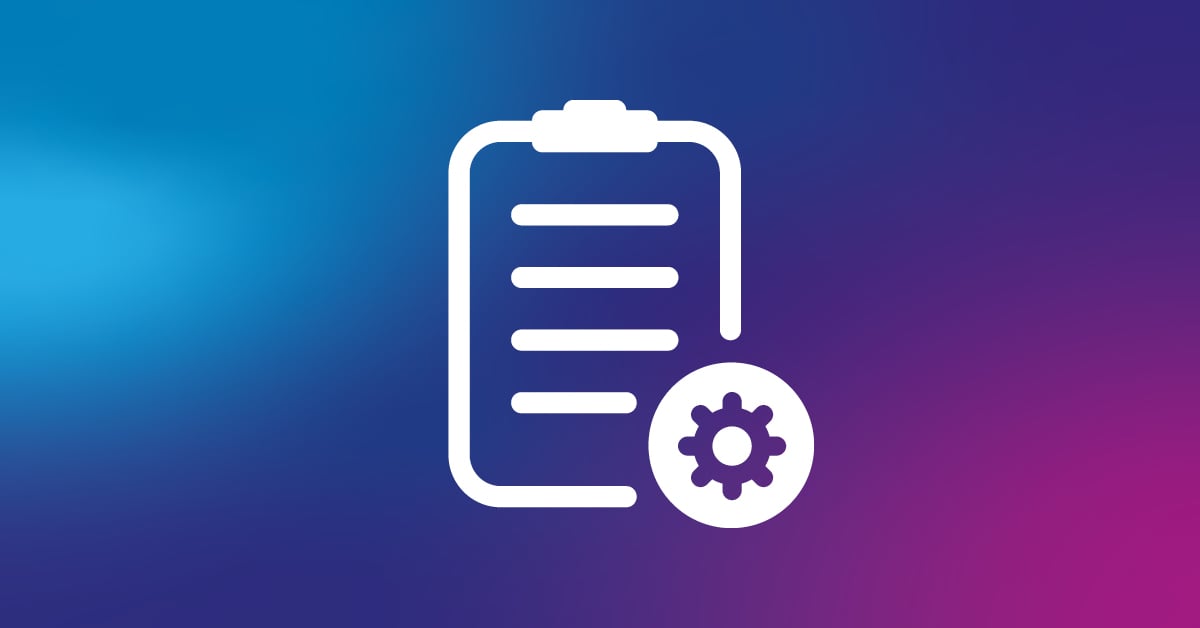Free Bandwidth Meter PRTG
Track your bandwidth comprehensively and for free
- Monitor download and upload speeds & detailed data traffic in real time
- Identify bandwidth bottlenecks and optimize resource allocation
- Proactively address issues before they slow your internet connection to a crawl
PRTG bandwidth meter: What you’ll find on this page
- It's how you use your network's bandwidth that counts
- 4 reasons why to choose PRTG as your bandwidth meter
- What bandwidth metering looks like in PRTG
- Complete, accurate, in-depth bandwidth usage data, 24/7
- Explore our preconfigured PRTG sensors for storage performance monitoring
- Bandwidth meter: FAQ
It's how you use your network's bandwidth that counts
How much bandwidth speed does your organization need?
If you think what you have is nowhere near enough to maintain optimal network performance, we're here to tell you that’s not necessarily the case.
You can improve download speeds, upload speeds, and have more stable, reliable LAN, WAN, and WiFi connections through optimization. The catch is that, to make effective adjustments, you need to know which hardware and software components on your network are using the most bandwidth, when they’re doing so, and why. Otherwise, you're just going in blind and hoping for the best.
Paessler PRTG's bandwidth meter makes the process quick and painless. Tracking and categorizing bandwidth consumption, alerting you if there are performance issues, and even helping you analyze long-term trends.
That means you can run a faster, more stable network, without having to constantly plead with your higher-ups for more money to throw at the problem.
PRTG makes measuring bandwidth as easy as it gets
Custom alerts and data visualization let you quickly identify and prevent network congestion, latency, jitter, and other online connectivity problems.
4 reasons why to choose PRTG as your bandwidth meter
User-friendly dashboards
Setting up and using PRTG's bandwidth meter couldn't be simpler if you tried. The automatic network discovery adds every device and application within your chosen IP range and assigns the appropriate sensors. And the interface feels instantly familiar, with data displayed in easy-to-understand charts and graphs.
Comprehensive monitoring
Much more than an internet speed test. PRTG gives you a complete picture of network traffic and the amount of bandwidth used. Preconfigured sensors monitor processes, applications, and the performance of your network devices, making troubleshooting bottlenecks and optimizing network performance a breeze.
Proactive planning
Optimizing bandwidth and ensuring a high-speed network is easy… when you have the right data. PRTG tracks usage across your network in real time, so you can make adjustments and optimize performance on the fly. Plus, you'll get automatically alerted the second your network's at risk of exceeding capacity.
Long-term visibility
PRTG’s bandwidth meter gives you an in-depth view of usage peaks and throughs, as well as other issues that might be impacting internet connection speed, throughput, and functionality or performance. And the sooner you spot patterns and trends, the better you can plan for future bandwidth requirements
What bandwidth metering looks like in PRTG
Diagnose network issues by continuously tracking bandwidth usage on modems, routers, switches, servers, and other connected hardware in your ethernet or wireless network. Show packet loss, latency, jitter, network traffic by IP address or protocol, and other key metrics in real time. Visualize monitoring data in clear graphs and dashboards to identify problems more easily. Gain the overview you need to troubleshoot bandwidth bottlenecks and network congestion.
Start bandwidth measuring with PRTG and see how it can make your network more reliable and your job easier.
Complete, accurate, in-depth bandwidth usage data, 24/7
PRTG tracks your hardware and software components' bandwidth usage data using a variety of protocols.
Our preconfigured bandwidth monitoring sensors support monitoring via SNMP, WMI, flow technologies – including NetFlow, sFlow, IPFIX, and jFlow – SSH, HTTP and HTTPS, ping, and others, which means they work with most major enterprise network vendors and manufacturers, including Cisco, Dell, and HPE.
Every sensor tracks a parameter that could impact your bandwidth, including availability and utilization, CPU load and memory usage, data packets, response time, jitter, latency, quality of service (QoS), speed, and traffic, alerting you if performance dips so you can make adjustments and optimize your internet connections (or send an angry email to your internet provider).
Your bandwidth meter at a glance – even on the go
Set up PRTG in minutes and use it on almost any mobile device.
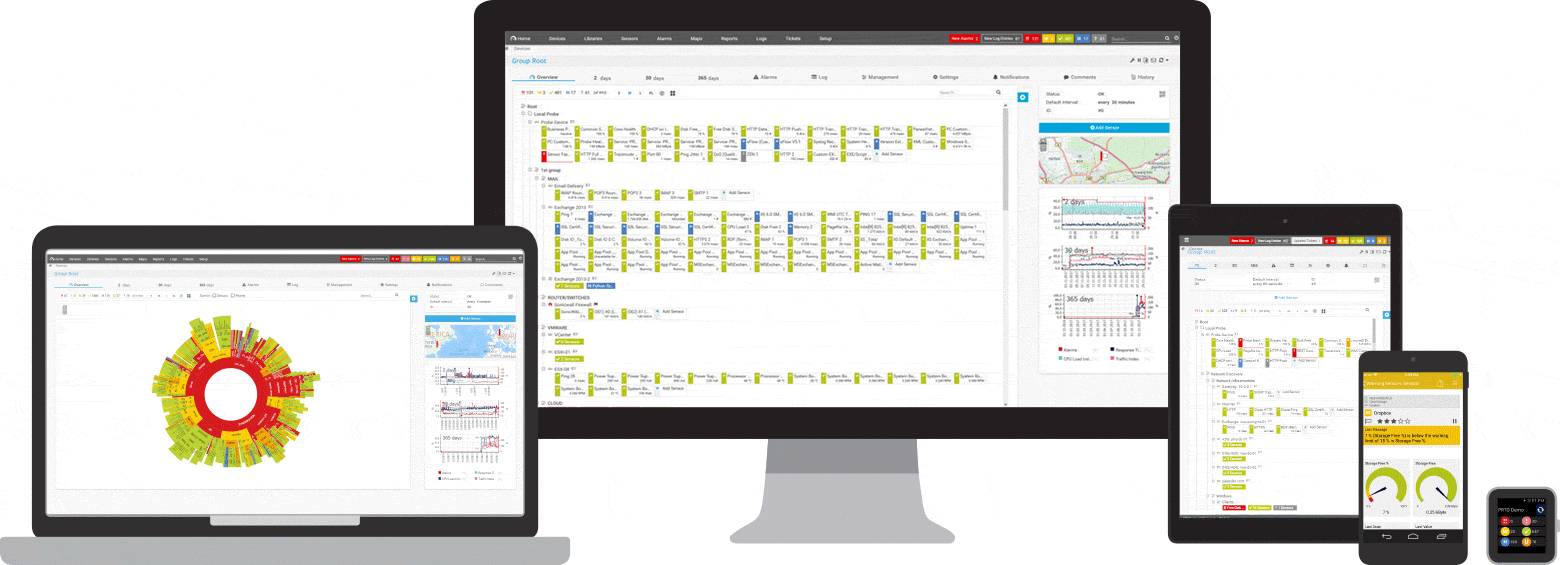

Find the root cause of the problem with our PRTG bandwidth meter solution
Real-time notifications mean faster troubleshooting so that you can act before more serious issues occur.
PRTG is compatible with all major vendors, products, and systems
Explore our preconfigured PRTG sensors for storage performance monitoring
PRTG comes with more than 250 native sensor types for monitoring your entire on-premises, cloud, and hybrid cloud environment out of the box. Check out some examples below!
Create innovative solutions with Paessler’s partners
Partnering with innovative vendors, Paessler unleashes synergies to create
new and additional benefits for joined customers.
ScriptRunner
With ScriptRunner, Paessler integrates a powerful event automation platform into PRTG Network Monitor.
“Excellent tool for detailed monitoring. Alarms and notifications work greatly. Equipment addition is straight forward and server initial setup is very easy. ...feel safe to purchase it if you intend to monitor a large networking landscape.”
Infrastructure and Operations Engineer in the Communications Industry, firm size 10B - 30B USD
PRTG makes measuring bandwidth as easy as it gets
Custom alerts and data visualization let you quickly identify and prevent network congestion, latency, jitter, and other online connectivity problems.

PRTG: The multi-tool for sysadmins
Adapt PRTG individually and dynamically to your needs and rely on a strong API:- HTTP API: Access monitoring data and manipulate monitoring objects via HTTP requests
- Custom sensors: Create your own PRTG sensors for customized monitoring
- Custom notifications: Create your own notifications and send action triggers to external systems
- REST Custom sensor: Monitor almost everything that provides data in XML or JSON format
We asked: would you recommend PRTG?
Over 95% of our customers say yes!
Paessler conducted trials in over 600 IT departments worldwide to tune its network monitoring software closer to the needs of sysadmins.
The result of the survey: over 95% of the participants would recommend PRTG – or already have.
Still not convinced?
More than 500,000
sysadmins love PRTG
Paessler PRTG is used by companies of all sizes. Sysadmins love PRTG because it makes their job a whole lot easier.
Monitor your entire IT infrastructure
Bandwidth, servers, virtual environments, websites, VoIP services – PRTG keeps an eye on your entire network.
Try Paessler PRTG
for free
Everyone has different monitoring needs. That’s why we let you try PRTG for free.
Start bandwidth measuring with PRTG and see how it can make your network more reliable and your job easier.
|
PRTG |
Network Monitoring Software - Version 25.1.104.1946 (March 18th, 2025) |
|
Hosting |
Download for Windows and cloud-based version PRTG Hosted Monitor available |
Languages |
English, German, Spanish, French, Portuguese, Dutch, Russian, Japanese, and Simplified Chinese |
Pricing |
Up to 100 sensors for free (Price List) |
Unified Monitoring |
Network devices, bandwidth, servers, applications, virtual environments, remote systems, IoT, and more |
Supported Vendors & Applications |
|

